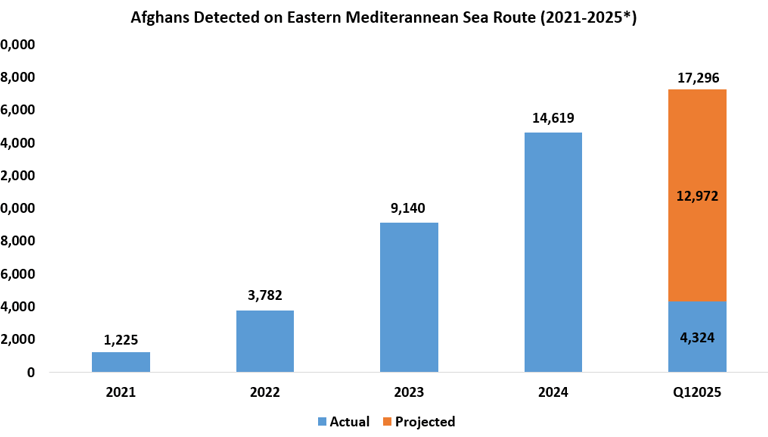Turkey: Afghan Sea Departures for Europe Could Hit Record High
Key Findings
Turkey has become a major transit country for irregular migrants attempting to reach Europe, especially since 2015.
The European Union (EU) and Turkey have an agreement on migration cooperation that is used to try and minimize migration into Europe via Turkey.
Since the EU-Turkey deal was renewed in 2021, a net figure of 49,000 Afghan migrants have left Turkey.
Afghans have been detected in increasing numbers in sea routes in the Eastern Mediterranean, increasing from 1,225 in 2021 to 14,619 in 2024.
The data suggests show that 49,000 Afghans have left Turkey since 2021, and over 36,000 Afghans have been detected on routes into Europe via the Eastern Mediterranean.
Read full report online or download it here.
Data source: FRONTEX. Q2-4 in 2025 are projections calculated by Orunmila. Chart by Orunmila.


Afghans Are Finding Ways Through to Europe
Many nationalities of migrant use Turkey as a springboard to reach Europe. For Afghans, despite increased security, they are finding a way through.
Turkey has become a major transit country for migrants attempting to reach Europe. Turkey is geographically close to troubled countries such as Iraq, Iran, and Syria, and its geographic position makes it the natural land bridge from Asia to Europe.
Turkey sits on the “Eastern Mediterranean Route” in the EU border agency, and data show that 1.7 million migrants have been detected on this route since 2009, peaking at 885,000 in 2015.(i) This inspired the EU to sign a migration cooperation deal with Turkey in 2016.(ii) The aim was to essentially keep migrants in Turkey, away from Europe, and with the Turkish authorities provided financial assistance. While these is eidence this deal is working, some nationalities are getting through. Of particular interest are Afghan migrants.
Data from Turkey show that between 2021 and 2024, (the last available data), the net change in the Afghan population in Turkey was -49,000, i.e., 49,000 more Afghans left Turkey than entered.(iii) However, Afghans are not giving up on trying to get into Europe. EU border agency “FRONTEX” statistics show that between 2021 and 2024, over 36,000 Afghans have been detected on the Eastern Mediterranean sea routes.(iv) This suggests Afghans no longer see Turkey as a medium to long-term base, and are finding ways through security into Europe.
Analysis and Implications
Afghans Still See Europe as a Realistic Destination
Despite the EU-Turkey deal, Afghans are not giving up on trying to reach Europe. This would suggest that Afghans feel there are “gaps” in the deal they can find.
Sea Routes Are Increasing
While the land routes into Europe via the Eastern Mediterranean route remained broadly stable between 2021 and 2024, the sea routes increased by nearly 1,100 percent from 1,225 detections in 2021 to 14,619 in 2024.(v) If the Q1 of 2025 number (4,324) continues at the same pace, encounters will top 16,000 by the end of 2025.
Turkish Geography is Attractive for Sea-Based Smugglers
While the land border between Turkey and the EU is heavily manned and secure, the country has a long coastline on the Aegean Sea. The proximity of Greek (and by extension, EU) islands is as short as 1,600 meters in some places, a distance that smuggling boats can easily cover before authorities can intervene.(vii)
Sources and References
i) FRONTEX. Migratory Routes. https://www.frontex.europa.eu/what-we-do/monitoring-and-risk-analysis/migratory-routes/migratory-routes/
ii) European Council. EU-Turkey statement, 18 March 2016 https://www.consilium.europa.eu/en/press/press-releases/2016/03/18/eu-turkey-statement/
iii) Turkish Statistical Institute (TURKSTAT.) Immigrants and emigrants by country of citizenship. https://data.tuik.gov.tr/Bulten/Index?p=International-Migration-Statistics-2023-53544&dil=2
iv) FRONTEX. Detections of illegal border crossings statistics. https://www.frontex.europa.eu/what-we-do/monitoring-and-risk-analysis/migratory-map/
v) Ibid.
vi) Ibid.
vii) Samos Island Explorer. https://www.samosin.gr/position_geographical_relief/
Orunmila Research is a consultancy specializing in migration analysis, international affairs, and geopolitical risk. We provide independent, evidence-based, data-driven analysis at the intersection of migration, conflict, and policy. We help governments, NGOs, and institutions understand the deeper, complex drivers behind border movements and instability to allow for a more informed and impactful debate.
Insights
Specializing in migration research.
info@orunmilaresearch.com
© 2025. All rights reserved.
We use AI-generated images for illustration purposes only. To protect the privacy and dignity of migrants, and to comply with local laws in places we operate and research, no photos of real individuals are used. All research and analysis is 100% human-generated.
